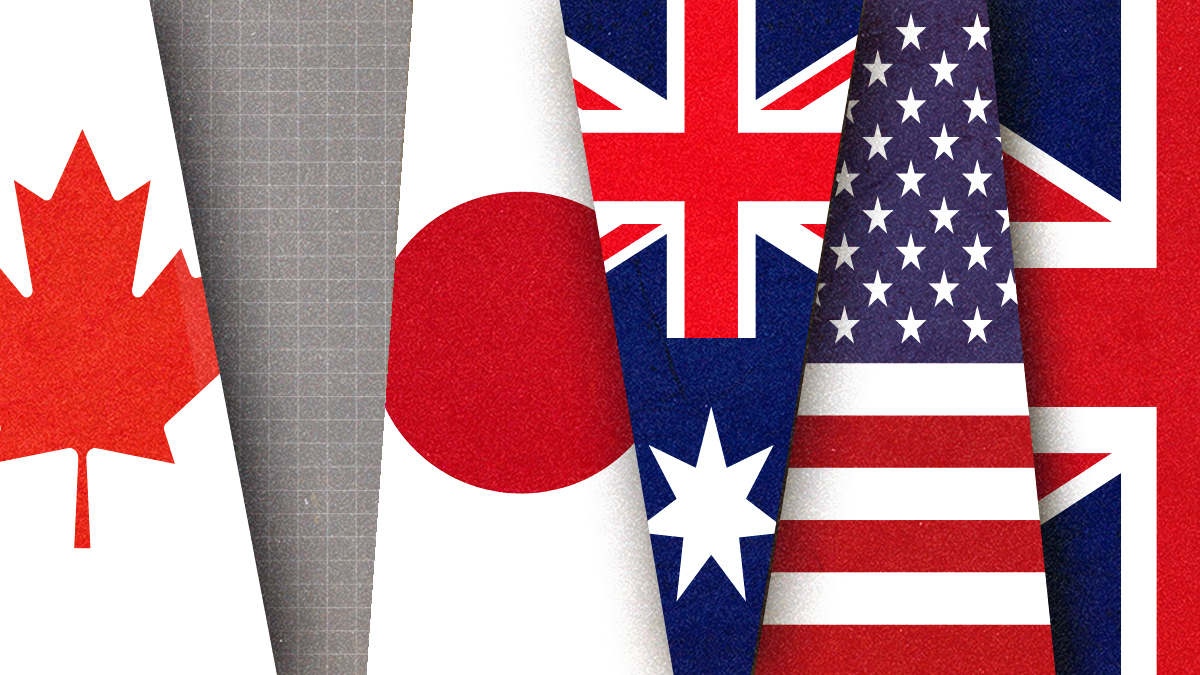On Monday — the day that Prime Minister Justin Trudeau told reporters that Canada is interested in joining the AUKUS defense alliance — documents were released at a public inquiry that showed that Canada’s intelligence agency believes China “clandestinely and deceptively interfered in both the 2019 and 2021 general elections.”
Also on Monday, as Chinese ships carried out exercises in disputed waters in the South China Sea, the US, UK, and Australia announced that they were talking to Japan about inviting that country to participate in Pillar II of the security pact.
China’s growing military and political belligerence is rattling other countries, and they are responding by drawing together in a way that would have been out of the question a decade ago.
Neighbors under pressure
Pillar I of AUKUS, which was announced in 2021, is a collaboration between Australia, the Americans, and the Brits aimed at adding a powerful new capacity to Australia’s military: nuclear-powered (though conventionally armed) submarines. This is a huge spend for Australia — $368 billion over 30 years — that carries an inherent political risk. And to make the deal, Canberra had to blow up relations with France by abandoning a deal to buy French subs. The Aussies only did that after a year of tense political and economic confrontations with China that left decision-makers in that country gravely concerned about its future in a neighborhood dominated by Beijing. Australia’s back was against the wall.
Like Australia, Japan is being driven to closer cooperation with the United States by its concerns about an increasingly powerful and assertive China. Japan’s trade-focused economy depends on international shipping passing freely through the South China Sea, for instance, where China has been clashing with the Philippines.
So Tokyo has reason to be interested in Pillar II of the AUKUS arrangement, which focuses on defense technology sharing, including quantum computing, hypersonic missiles, artificial intelligence, and electronic warfare — all areas where China presents a technological challenge, and where Japan could offer expertise.
With China rapidly expanding its military, Japan has decided to break with its post-war pacifist tradition and dramatically increase defense spending.
Northern lightweights
Canada is also opening its checkbook, but at a much smaller scale, which would explain why the AUKUS partners are making a point of talking about doing business with Japan, rather than Canada.
Nobody is talking about adding other countries as full members, Australian Prime Minister Anthony Albanese said Tuesday, but proceeding on a project-by-project basis.
Historically, Canada spends little on defense, falling well short of the 2% of GDP that NATO members have all agreed to spend. In an increasingly dangerous world, though, pressure is mounting for Canada to step up, and on Monday, Trudueau’s government did roll out a five-year plan to bring defense spending up to 1.76% of GDP by 2030, up from 1.38% last year.
Allies welcomed the announcement, but there was nothing significant enough to make Canada a much more desirable partner for AUKUS, says Eugene Lang, a former Liberal defense official turned Queens University professor. Officials are interested.
“I just don’t know that we're doing anything to get their attention,” he says. “What they're doing in AUKUS is investing in developing brand-new technologies. To my knowledge, Canada has not got any specific money set aside for any of that.”
University of Ottawa Professor Thomas Juneau, who has interviewed allied officials about Canada’s potential role in AUKUS, found that Canada is increasingly seen as a free rider in defense and intelligence circles. It’s not surprising that Japan was invited before Canada, he says.
“It's really normal for AUKUS to bring in Japan before Canada because Japan is not only a much bigger country than we are, but it's right next to China.”
Wolf warriors
On the other hand, because of its Five Eyes intelligence-sharing experience, Canada could more easily cooperate with AUKUS than Japan, says Graeme Thompson, a senior analyst with Eurasia Group.
And while it may not be spending enough money to be taken seriously, the Trudeau government has moved to be more circumspect in its relationship with China, limiting Chinese investment in critical minerals and being cautious about research projects.
“The scales have fallen from a lot of politicians’ eyes in the West,” Thompson says. “The question remains, how do you have constructive diplomatic and economic relations with Beijing, while at the same time competing with them geopolitically and seeking to build up and maintain deterrence?”
China will object to the new alliances being organized around it, but don’t expect Beijing to stop buying sabers and rattling them.
“China has a rising economy, so the idea that its rising economic power wouldn't come with rising geopolitical ambition is a fantasy, and we've kind of believed in that fantasy for a while, not just in Canada but in other Western countries,” says Juneau.
“But it was a fantasy all along.”
